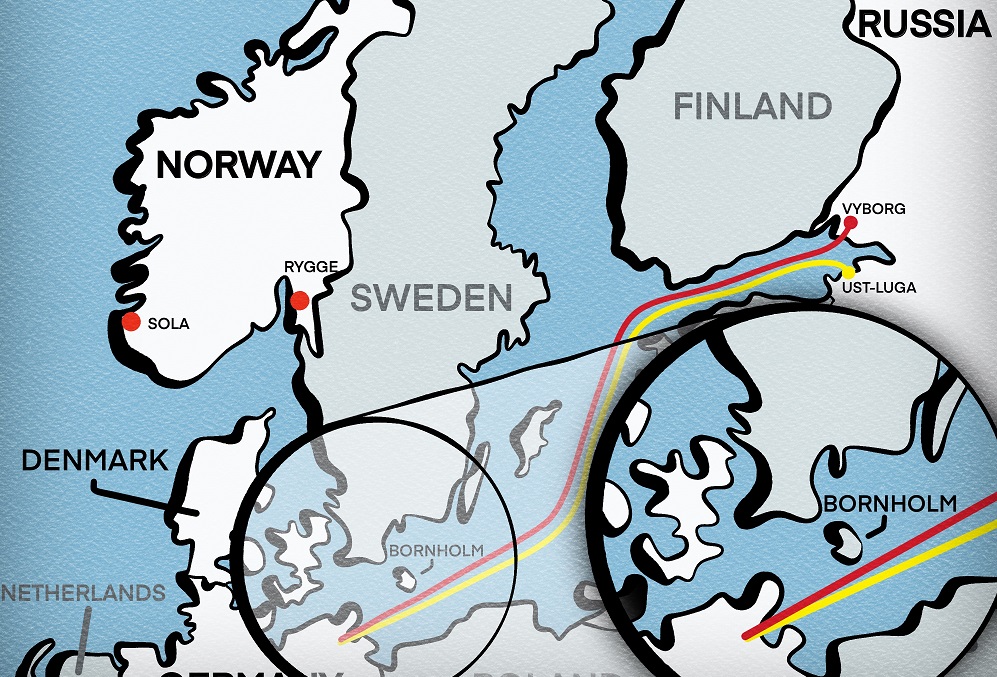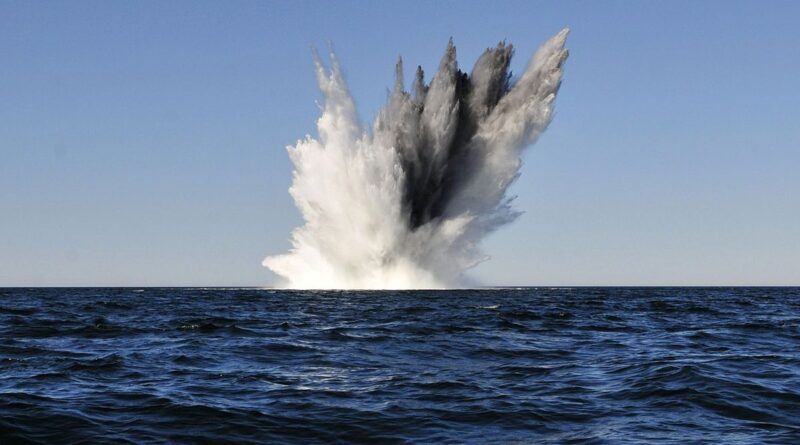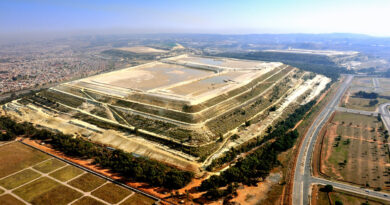Nord Stream blast to end in multi-billion dollar arbitration claims?
The attack last September on the Nord Stream gas pipeline system, which runs for about 750 miles from Russia to Germany, has fueled an enormous amount of speculation and theorising. This week, those theories reached the United Nations Security Council, after Russia demanded a debate on the incident, and called for a UN inquiry.
Russia’s demands followed a report by the veteran investigative reporter Seymour Hersh, claiming that the US, with support from Norway, had sabotaged the pipeline in a “covert sea operation”.
Vassily Nebenzia, Russia’s ambassador to the UN, said that thanks to Hersh’s story “we found out not only that the US did it, but how they did it.” There was, he added “no doubt as to the fact that the American journalist is telling the truth.”
The US has described Hersh’s story as “false and complete fiction”. John Kelley, the US ambassador to the UN, this week said that Russia’s call for an inquiry was “a blatant attempt to distract” from the forthcoming meeting of the UN General Assembly marking a year since the invasion of Ukraine. Other journalists and analysts have challenged many of the operational details in Hersh’s report.

Eventually more evidence may emerge to clarify our understanding of the attacks. The Danish, Swedish and German authorities have launched investigations that are still under way. But from an energy market perspective, there are already some important lessons.
The destruction of Nord Stream is likely to loom large in arbitration cases over Russian gas supplies to Europe last year. Uniper and RWE of Germany and Engie of France have filed claims that will be heard by an international arbitration panel in Stockholm, arguing that they are owed damages by Gazprom of Russia because of its failure to deliver contracted volumes of gas.
The standard model for the majority of Russia’s gas exports to the EU has been under long-term contracts. In Uniper’s case, some of those contracts stretched out to 2035. When critics complained about Europe’s dependence on imports from Russia, a European could respond that Gazprom and its predecessors had always honoured those supply contracts, through the Cold War and the political upheavals that followed.
In June of last year, that changed. The flow of gas through Nord Stream 1 fell sharply, with Gazprom blaming Siemens for its failure to return critical gas compressor units after maintenance. In July, flows were stepped down further, as Gazprom said more equipment needed repairs.
Then at the end of August flows were shut off completely, and never restarted. Gazprom said oil leaks had forced it to shut down the one remaining operational compressor on the pipeline. Western governments argued that Russia was attempting to use gas as a weapon to undermine European support for Ukraine.
Uniper says Gazprom’s failure to supply contracted volumes, at a time when European spot prices were at record highs, caused it “significant financial damages”. Having to go out into the market to replace the lost Russian gas cost it at least €11.6 billion up to the end of November, Uniper said, and the figure is expected to keep growing through to the end of 2024.
Klaus-Dieter Maubach, Uniper’s chief executive, said “We are pursuing these legal proceedings with all due vigor: We owe this to our shareholders, our employees and the taxpayers.”
Uniper had been Germany’s biggest purchaser of Russian gas, but other European buyers will also have suffered significant additional costs. Flows through Nord Stream 1 operating at full capacity were 55 billion cubic metres per year.
As a rough first approximation, given an average European benchmark TTF gas price of about US$43 per million British Thermal Units, the total cost of buying gas in the market to replace Nord Stream 1’s volumes in the second half of last year would have been about US$40 billion.
The extra costs for Gazprom’s European customers will have been the difference between that amount and what they would have had to pay under their contracts for Russian gas. Uniper, RWE and Engie have filed their claims for damages on that basis, and other European buyers may follow suit.
After the flows through Nord Stream 1 were first reduced last summer, Gazprom declared force majeure, arguing that its failure to fulfill its contractual obligations was due to circumstances beyond its control. Now the pipeline has been rendered inoperable, the question of force majeure is likely to be a central issue in the arbitration proceedings.
Uniper rejected Gazprom’s claim of force majeure last July, and can be expected to dispute it again at arbitration. If proof emerges that the US was in fact responsible for the attack on Nord Stream, or even if the culprit just remains a mystery, then Gazprom’s case will carry much more weight.
If it emerges incontrovertibly that it was Russia, given that the Russian government owns just over 50% of Gazprom, the assertions of force majeure will be much harder to sustain.
Given the fundamental breakdown in relations between Russia and the West, it might be thought that Gazprom could simply choose to ignore whatever verdict the arbitration panel hands down. That view would be a mistake.
Gazprom is still seeking to sign sales agreements with other buyers around the world, and being seen as a supplier that abides by contract terms, including arbitration decisions in the event of disputes, is important for that.
And the long-term future of relations between Russia and the EU is still uncertain. If, in some very different circumstances, Gazprom wants to resume its role as a supplier to Germany and other western European countries, in will have to resolve any outstanding issues from the tribunal.
Seymour Hersh argues that the US decided to wreck Nord Stream because “as long as Europe remained dependent on the pipelines for cheap natural gas, Washington was afraid that countries like Germany would be reluctant to supply Ukraine with the money and weapons it needed to defeat Russia.”
That argument is debatable. At the time of the explosions, no gas was flowing through the Nord Stream system, and it was already clear there was a good chance none would ever flow again. European governments have been working hard to reduce their need for Russian gas: Germany, for example has ordered five Floating Regasification and Storage Units to import LNG.
Olaf Scholz, Germany’s chancellor, said in August: “Russia is no longer a reliable business partner… It has reduced gas deliveries everywhere in Europe, always referring to technical reasons that never existed. And that’s why it’s important not to walk into Putin’s trap.” Under a European Commission’s plan, the EU hopes to end its imports of Russian gas by 2027, “if all works well”, in the words of the commission’s executive vice-president Frans Timmermans.
The dependence scenario sketched out by Hersh is not impossible, at least until the latest wave of LNG supply starts coming on to world markets in 2026-27. Europe got through the winter of 2022-23 better than Russia had hoped, thanks in large part to the mild weather. But it still has at least three potentially difficult winters ahead if the war in Ukraine continues and tensions between Russia and the EU remain high.
In the longer term, though, Europe is likely to never again rely in Russia for its gas. Bombing the pipeline would have been a high-risk operation for the US, in terms of the consequences of being caught sabotaging infrastructure in allied countries’ waters that is part-owned by allied countries’ companies such as Engie and Gasunie. And it would have had only a short-term payoff.
For Gazprom, on the other hand, the damage to the pipeline could have a lasting benefit, potentially saving it tens of billions of dollars in compensation. Although that seems like it will depend on Russia not being identified as the perpetrator. While the claims and counter-claims are still swirling, it is worth noting the words of Rosemary DiCarlo, the UN under-secretary-general, at the Security Council hearing this week. “While we don’t know exactly what happened beneath the waters of the Baltic Sea in September 2022, one thing is certain,” she said. “Whatever caused the incident, its fallout counts among the many risks the invasion of Ukraine has unleashed. One year since the start of the war, we must redouble our efforts to end it, in line with international law and the UN Charter.”



